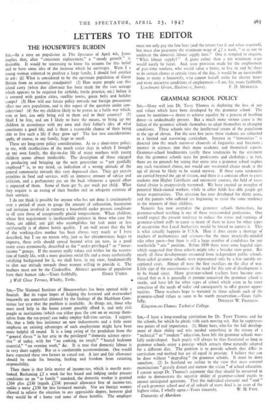LETTERS TO THE EDITOR
THE HOUSEWIFE'S BURDEN
SIR,—In a note on population in The Spectator of April 4th, Janus implies that, after "consistent replacement," a " steady growth " is desirable. It would be interesting to know his reasons for this belief and to have some idea of the increase which he envisages. Were I a young woman exhorted to produce a large family, I should feel entitled to ask: (.1) What is considered to be the optimum population of Great Britain from an economic standpoint? (2) How many people can this island carry (when due allowance has been made for the vast acreage which appears to be required for airfields, battle practice, etc.) before it is covered with garden cities, satellite towns, green belts and holiday camps? (3) How will our future policy towards our foreign possessions affect our own population, and is this aspect of the question under con- sideration? (4) Are my children likely to be pawns in a futile war which, won or lost, can only bring evil to them and to their country? (5) Shall I be free, and am I likely to have the means, to bring up my children in accordance with my own and their father's idea of what constitutes a good life, and is there a reasonable chance of their being able to live such a life if they grow up? The last two considerations apply, of course, to any family, large or small.
These are long-term policy considerations. As to a short-term policy, to me, with recollections of the much easier days in which I brought up my own family, the day-to-day life of many mothers with young children seems almost intolerable. The description of those engaged in producing and bringing up the next generation as "not gainfully employed " is, to my mind, an indication of a wrong attitude of the general community towards this very depressed class. They get certain priorities in food and services; with an immense amount of advice and criticism, and a perfunctory pat on the back whenever a special effort is expected of them. Some of them get Ss. per week per child. What they require is an easing of their burden and an adequate estimate of their services.
I do not think it possible for anyone who has not done it continuously over a period of years to gauge the amount of exhaustion, frustration and irritation involved m running a household under present conditions to all save those of exceptionally placid temperament. When children, whose first requirement is inexhaustible patience in those who care for them, are added, any girl who accomplishes her task more or less satisfactorily is of almost heroic quality. I am well aware that the lot of the working-class mother has been always very much as- I have described, but I see no reason why, just as her circumstances begin to improve, these evils should spread beyond what are now, in a good many cases erroneously, described as the " under-privileged" or " lower- income " groups. If the country really values and wishes for the restora- tion of family life, with a more gracious social life and a more aesthetically satisfying background for it, we shall have, in my view, fundamentally to alter our attitude towards those women willing to provide it. The mothers must not be the Cinderellas. Abstract questions of population have their human side.—Yours faithfully, GRACE USHER. 3 Well Close Terrace, Whitby, Yorks.


































 Previous page
Previous page